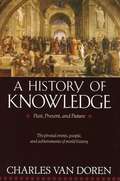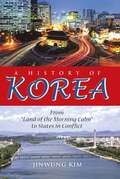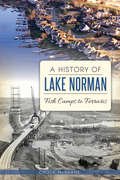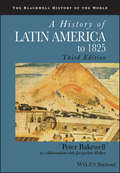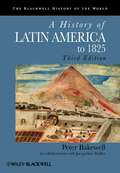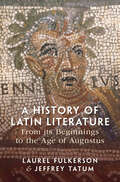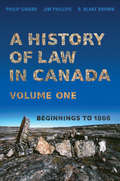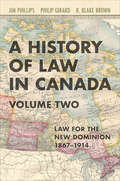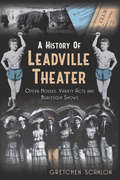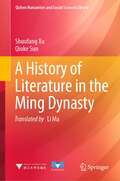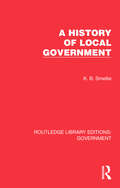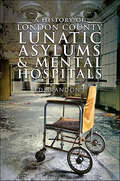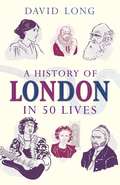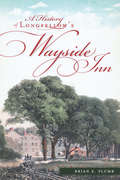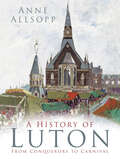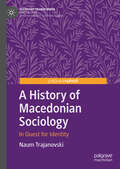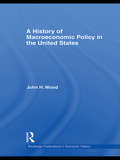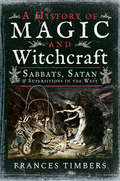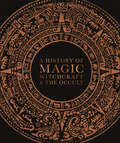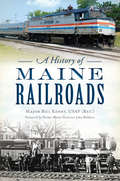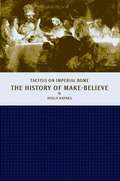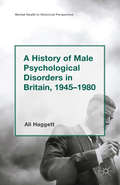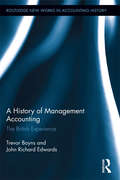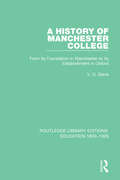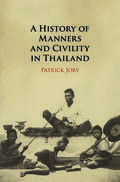- Table View
- List View
A History of Knowledge: Past, Present, and Future
by Charles Van DorenA one-volume reference to the history of ideas that is a compendium of everything that humankind has thought, invented, created, considered, and perfected from the beginning of civilization into the twenty-first century. Massive in its scope, and yet totally accessible, A HISTORY OF KNOWLEDGE covers not only all the great theories and discoveries of the human race, but also explores the social conditions, political climates, and individual men and women of genius that brought ideas to fruition throughout history. "Crystal clear and concise... Explains how humankind got to know what it knows." Clifton Fadiman.
A History of Korea: From Land of the Morning Calm to States in Conflict
by Jinwung KimContemporary North and South Korea are nations of radical contrasts: one a bellicose totalitarian state with a failing economy; the other a peaceful democracy with a strong economy. Yet their people share a common history that extends back more than 3,000 years. In this comprehensive new history of Korea from the prehistoric era to the present day, Jinwung Kim recounts the rich and fascinating story of the political, social, cultural, economic, and diplomatic developments in Korea's long march to the present. He provides a detailed account of the origins of the Korean people and language and the founding of the first walled-town states, along with the advanced civilization that existed in the ancient land of "Unified Silla." Clarifying the often complex history of the Three Kingdoms Period, Kim chronicles the five-century long history of the Choson dynasty, which left a deep impression on Korean culture. From the beginning, China has loomed large in the history of Korea, from the earliest times when the tribes that would eventually make up the Korean nation roamed the vast plains of Manchuria and against whom Korea would soon define itself. Japan, too, has played an important role in Korean history, particularly in the 20th century; Kim tells this story as well, including the conflicts that led to the current divided state. The first detailed overview of Korean history in nearly a quarter century, this volume will enlighten a new generation of students eager to understand this contested region of Asia.
A History of Lake Norman: Fish Camps to Ferraris (Brief History)
by Chuck McshaneOn a muggy September day in 1959, North Carolina governor Luther Hodges set off the first charge of dynamite for the Cowan's Ford Dam project. The dam channeled Catawba River waters into the largest lake in North Carolina: Lake Norman. The project was the culmination of James Buchanan Duke's dream of an electrified South and the beginning of the region's future. Over the years, the area around Lake Norman transformed from a countryside of cornstalks and cattle fields to an elite suburb full of luxurious subdivisions and thirty-five-foot sailboats. Journalist and historian Chuck McShane traces the triumphs and troubles of Lake Norman from the region's colonial beginnings to its modern incarnation.
A History of Latin America to 1825 (Blackwell History of the World #11)
by Peter BakewellThe updated and enhanced third edition of A History of Latin America to 1825 presents a comprehensive narrative survey of Latin American history from the region's first human presence until the majority of Iberian colonies in America emerged as sovereign states c. 1825. This edition features new content on the history of women, gender, Africans in the Iberian colonies, and pre-Columbian peoples Includes more illustrations to aid learning: over 50 figures and photographs, several accompanied by short essays Concentrates on the colonial period and earlier, expanding coverage of the period and incorporating more social and cultural history with the political narrative
A History of Latin America to 1825 (Third Edition)
by Jacqueline Holler Peter BakewellThe updated and enhanced third edition of A History of Latin America to 1825 presents a comprehensive narrative survey of Latin American history from the region's first human presence until the majority of Iberian colonies in America emerged as sovereign states c. 1825. This edition features new content on the history of women, gender, Africans in the Iberian colonies, and pre-Columbian peoples Includes more illustrations to aid learning: over 50 figures and photographs, several accompanied by short essays Concentrates on the colonial period and earlier, expanding coverage of the period and incorporating more social and cultural history with the political narrative
A History of Latin Literature From its Beginnings to the Age of Augustus
by Laurel Fulkerson Jeffrey TatumLatin literature exploded onto the scene from relatively humble beginnings in the third century BCE. In an astonishingly short time the Romans adopted and adapted nearly all the genres of literature known to them and not only were they well aware of their large-scale appropriation but even, curiously, boasted of it. This readable new history of Latin literature covers the full span of the Roman republic, concluding with the age of Augustus, whose great poets engaged with the enormous political and cultural changes of their time and laid the foundations for the literature of the Imperial period. All the major writers are covered but attention is also paid to more fragmentary but still key authors such as Ennius, Cato, Lucilius, and Varro. Readers are given the essential historical, cultural, and literary background as well as close readings of specific passages, which reveal the charm and complexity which animate Latin literature.
A History of Law in Canada, Vol. 1: Beginnings to 1866 (Osgoode Society for Canadian Legal History #1)
by R. Blake Brown Philip Girard Jim PhillipsThis book is the first of two volumes devoted to the history of law in Canada. This volume begins at a time just prior to European contact and continues to the 1860s, while volume two will start with Confederation and end at approximately 2000. The history of law includes substantive law, legal institutions, legal actors and legal culture. The book assumes that since 1500 there have been three legal systems in Canada – the Indigenous, the French, and the English. At all times, these systems have co-existed and interacted, with the relative power and influence of each being more or less dominant in different periods. The history of law cannot be treated in isolation, and this book examines law as a dynamic process, shaped by and affecting other histories over the long term. The law guided and was guided by economic developments, was influenced and moulded by the nature and trajectory of political ideas and institutions, and variously exacerbated and mediated by inter-cultural exchange and conflict. These themes are apparent in this examination, and through most areas of law including family law, constitutional, commercial, land settlement and tenure, and criminal.
A History of Law in Canada, Volume Two: Law for a New Dominion, 1867–1914 (Osgoode Society for Canadian Legal History)
by R. Blake Brown Philip Girard Jim PhillipsThis is the second of three volumes in an important collection that recounts the sweeping history of law in Canada. The period covered in this volume witnessed both continuity and change in the relationships among law, society, Indigenous peoples, and white settlers. The authors explore how law was as important to the building of a new urban industrial nation as it had been to the establishment of colonies of agricultural settlement and resource exploitation. The book addresses the most important developments in the seventeenth, eighteenth, and nineteenth centuries, including legal pluralism and the co-existence of European and Indigenous law. It pays particular attention to the Métis and the Red River Resistance, the Indian Act, and the origins and expansion of residential schools in Canada. The book is divided into four parts: the law and legal institutions; Indigenous peoples and Dominion law; capital, labour, and criminal justice; and those less favoured by the law. A History of Law in Canada examines law as a dynamic process, shaped by and affecting other histories over the long term.
A History of Leadville Theater: Opera Houses, Variety Acts and Burlesque Shows
by Gretchen ScanlonWhen the West was wild, the glitziest streets in Colorado ran through Leadville, where opera, variety and burlesque lit up Magic City theaters. Theatrical legends Buffalo Bill and Oscar Wilde graced the Tabor Opera House, while revolutionary Susan B. Anthony reached a rough mining audience from a stage atop a bar. Thomas Kemp spared no expense on the risque Black Crook at the Grand Central Theater, complete with a grand waterfall, a trapdoor and dragons. Follow Leadville historian Gretchen Scanlon through these theatrical glory days, from the glamorous productions and stump speeches to the offstage theft and debauchery that kept the drama going even when the curtain fell.
A History of Literature in the Ming Dynasty (Qizhen Humanities and Social Sciences Library)
by Shuofang Xu Qiuke SunThis book explores poems, novels, legends, operas and other genres of writing from the Ming Dynasty. It is composed of two parts: the literary history; and comprehensive reference materials based on the compilation of several chronologies. By studying individual literary works, the book analyzes the basic laws of the development of literature during the Ming Dynasty, and explores the influences of people, time, and place on literature from a sociological perspective. In turn, it conducts a contrastive analysis of Chinese and Western literature, based on similar works from the same literary genre and their creative methods. The book also investigates the relationship between literary theory and literary creation practices, including those used at various poetry schools. In closing, it studies the unique aesthetic traits of related works. Sharing valuable insights and perspectives, the book can serve as a role model for future literary history studies. It offers a unique resource for literary researchers, reference guide for students and educators, and lively read for members of the general public.
A History of Local Government (Routledge Library Editions: Government)
by K. B. SmellieOriginally published in 1946, this book traces the essential changes in structure, areas and in the relations between local and central authorities in England from 1832 to the Education Act of 1944. Modern English local government has developed from the industrial and scientific revolution and the growth of political democracy since 1832 and the present system is the result of an interplay between political, economic and scientific factors. The book contains a stand-alone chapter on London government and an introductory chapter on the condition of local government between 1689 and 1832.
A History of London County Lunatic Asylums & Mental Hospitals
by Ed BrandonFrom the Middle-Ages onwards, London’s notorious Bedlam lunatic hospital saw the city’s ‘mad’ locked away in dank cells, neglected and abused and without any real cure and little comfort. The unprecedented growth of the metropolis after the Industrial Revolution saw a perceived ‘epidemic’ of madness take hold, with ‘county asylums’ seen by those in power as the most humane or cost-effective way to offer the mass confinement and treatment believed necessary. The county of Middlesex – to which London once belonged – would build and open three huge county asylums from 1831, and when London became its own county in 1889 it would adopt all three and go on to build or run another eight such immense institutions. Each operated much like a self-contained town; home to thousands and often incorporating its own railway, laundries, farms, gardens, kitchens, ballroom, sports pitches, surgeries, wards, cells, chapel, mortuary, and more, in order to ensure the patients never needed to leave the asylum’s grounds. Between them, at their peak London’s eleven county asylums were home to around 25,000 patients and thousands more staff, and dominated the physical landscape as well as the public imagination from the 1830s right up to the 1990s. Several gained a legacy which lasted even beyond their closure, as their hulking, abandoned forms sat in overgrown sites around London, refusing to be forgotten and continuing to attract the attention of those with both curious and nefarious motives. Hanwell (St Bernard’s), Colney Hatch (Friern), Banstead, Cane Hill, Claybury, Bexley, Manor, Horton, St Ebba’s, Long Grove, and West Park went from being known as ‘county lunatic asylums’ to ‘mental hospitals’ and beyond. Reflecting on both the positive and negative aspects of their long and storied histories from their planning and construction to the treatments and regimes adopted at each, the lives of patients and staff through to their use during wartime, and the modernisation and changes of the 20th century, this book documents their stories from their opening up to their eventual closure, abandonment, redevelopment, or destruction.
A History of London in 50 Lives
by David Long"It is not the walls that make the city, but the people who live within them." - George VIAs George VI so rightly said, it is the loves, schemes, failures, battles, intrigues and dreams, of the people who live in a city that make it what it is. And in a city as vibrant and chaotic as London those lives are going to be quite extraordinary.Seeking to unravel the stories locked within each district, London expert David Long turns to the characters that have defined them. From Nanci Astor, Jimmi Hendrix and Harry Gordon Selfridge's influence on Mayfair, to Karl Marx on Soho, Charles Darin on Bloomsbury, Virginia Woolf on Fitzrovia and Polly the Parrot on Spitalfields, A History of London in 50 Lives, is a positive smorgasbord of the illustrious and notorious.
A History of Longfellow's Wayside Inn
by Brian E. PlumbLongfellow's Wayside Inn in Sudbury, Massachusetts, is the most venerable of all the old historic taverns still operating in America. Built three hundred years ago by the How family, it has witnessed Indian affairs, colonial wars and the coming of the stagecoach, railroad and automobile. The poet Henry Wadsworth Longfellow immortalized it in verse with his 1863 collection Tales of a Wayside Inn, suddenly making it a desired destination for travelers. Longfellow's romanticized description of the inn later so inspired Henry Ford that he purchased and restored the building and its surrounding three thousand acres. Join author Brian Plumb as he traverses the highways of New England's history to discover the stories of Longfellow's Wayside Inn.
A History of Luton: From Conquerors to Carnival
by Anne AllsoppIN THE PAST, Luton was a market town and, for many years, was also a centre for the brewing industry. In the 19th century it became famous for hat making, and more recently it has grown into a thriving industrial centre. During the Second World War it played an important part in the manufacture of army vehicles, and children bound for school had to dodge the Churchill tanks on their way to various theatres of conflict. Nowadays, Luton Airport is the gateway for all types of traveller and the town is well known for its famous football team. Luton has always provided visitors with a warm welcome and many have stayed and made the town their home. Local industry offered employment opportunities in the early 20th century and many had cause to be grateful for its relative prosperity during the Great Depression. Following the Second World War, immigrants from the Indian subcontinent and from the West Indies brought with them colourful new cultures that are celebrated in the annual Carnival. This fascinating and illustrated account of Luton’s past will inform and delight anyone who lives in the town and inspire those who grew up here.
A History of Macedonian Sociology: In Quest for Identity (Sociology Transformed)
by Naum TrajanovskiThis book is the first English-language monograph about the institutional development of sociology in (North) Macedonia. It maps and discusses the contexts, goals, and merits of the pioneering attempts for sociological research in the interwar period, early post-war educational and publishing politics, the institutionalization of sociology in socialist Macedonia in the course of the 1960s, its cross-national exchanges, as well as its major trajectories and debates up until the present days. Against the backgrounds of the political and intellectual histories of Yugoslav and post-Yugoslav Macedonia, it argues that the development of the sociological activities, themes, and arguments is entwined with the Macedonian nation- and state-building.
A History of Macroeconomic Policy in the United States (Routledge Explorations in Economic History)
by John H. WoodThis book examines the controlling influences that drive macroeconomic policies in the United States. It addresses the history of the interests, ideas, and practices of monetary and fiscal policies in the United States.
A History of Magic and Witchcraft: Sabbats, Satan & Superstitions in the West
by Frances TimbersThe author of Magic and Masculinity explores the history and development of magic and witchcraft in Western society. Broomsticks, cauldrons, familiars, and spells—magic and witchcraft conjure a vivid picture in our modern-day imagination. While much of our understanding is rooted in superstition and myth, the history of magic and witchcraft offers a window into the past. It illuminates the lives of ordinary people in the past and elucidates the fascinating pop culture of the premodern world. Blowing away folkloric cobwebs, this enlightening new history dispels many misconceptions surrounding witchcraft and magic that we still hold today. From Ancient Greece and Rome to the Middle Ages and the Early Modern Era, historian Frances Timbers details the impact of Christianity and popular culture in the construction of the figure of the &“witch.&” The development of demonology and ceremonial magic is combined with the West&’s troubled past with magic and witchcraft to chart the birth of modern Wiccan and Neopagan movements in England and North America. Witchcraft is a metaphor for oppression in an age in which persecution is an everyday occurrence somewhere in the world. Fanaticism, intolerance, prejudice, authoritarianism, and religious and political ideologies are never attractive. Beware the witch hunter!
A History of Magic, Witchcraft, and the Occult (DK A History of)
by DKDiscover the beguiling history of witchcraft, magic, and superstition through the centuries in this stunningly illustrated title. A History of Magic, Witchcraft and the Occult charts the extraordinary narrative of one of the most interesting and often controversial subjects in the world, covering everything from ancient animal worship and shamanism, through alchemy and divination to modern Wicca and the resurgence of the occult in 21st-century literature, cinema, and television. Providing readers with a comprehensive account of everything from Japanese folklore and Indian witchcraft to the differences between black and white magic, and dispelling myths such as those surrounding the voodoo doll and Ouija, the book explores the common human fascination with spells, superstition, and the supernatural. This riveting read on witchcraft further includes: - Engaging text and lavish illustrations with over 500 full-color images that bring the subject to life.- Special features on aspects of magic, such as oracle bones of ancient China, the Knights Templar, and magic at the movies, and &“plants and potions&”, such as mandrake and belladonna examine topics in great detail.- Quick-fact panels explore magic origins, key figures, key deities, uses in spells, structures of religions, and more.The perfect introduction to magic and the occult, it explores forms of divination from astrology and palmistry to the Tarot and runestones and offers key insights into the ways in which magic has interacted with religion. The most comprehensive illustrated history of witchcraft available, A History of Magic, Witchcraft and the Occult will enthral and fascinate anyone interested in spiritualism and the occult.
A History of Maine Railroads (Transportation)
by Major Bill Kenny USAF (Ret.)Maine is populated with intriguing characters who set in motion a fascinating, compelling story of railroads and the unique communities they helped to build. One of the first states to build railroads and trolleys in the United States, Maine at one point had more than ninety communities with trolleys. Standard-gauge and "two-footers" crossed the state, including the St. Lawrence & Atlantic and the Bangor & Aroostook. From an international electric trolley to the attempted World War I dynamiting of a railroad bridge between the United States and Canada, the state is home to a rich rail heritage. Join Bill Kenny as he takes you on a journey from the first tracks made of wood to today's high-speed Downeaster Amtrak train.
A History of Make-Believe: Tacitus on Imperial Rome
by Holly HaynesAn illuminating reading of Tacitus, this work points to a new understanding of the logic of Roman rule during the early Empire. Tacitus, in Holly Haynes' analysis, does not write about the reality of imperial politics and culture but about the imaginary picture that imperial society makes of these concrete conditions of existence.
A History of Male Psychological Disorders in Britain, 1945-1980 (Mental Health in Historical Perspective)
by Alison HaggettThis book is open access under a CC BY license and explores the under-researched history of male mental illness from the mid-twentieth century. It argues that statistics suggesting women have been more vulnerable to depression and anxiety are misleading since they underplay a host of alternative presentations of 'distress' more common in men.
A History of Management Accounting: The British Experience (Routledge New Works in Accounting History)
by Richard Edwards Trevor BoynsThere is growing interest in the history of accounting amongst both accounting practitioners and accounting academics. This interest developed steadily from about 1970 and really ‘took off’ in the 1990s. However, there is a lack of texts dealing with major aspects of accounting history that can be used in classrooms, to inform new researchers, and to provide a source of reference for established researchers.The great deal of research into cost and management accounting in Britain published in academic journals over the last twenty years–including the authors' own contributions–makes The History of Cost and Management Accounting an essential contribution to the field.
A History of Manchester College: From its Foundation in Manchester to its Establishment in Oxford (Routledge Library Editions: Education 1800-1926 #3)
by V. D. DavisThis book, first published in 1932, tells the progress of Manchester College, founded in Manchester in 1786, and since 1889 established at Oxford, as a postgraduate School of Theology and place of training for the ministry of religion. This title will be of interest to students of history and education.
A History of Manners and Civility in Thailand
by Patrick JoryManners have long been a central concern of Thai society. Kings, aristocrats, prime ministers, monks, army generals, politicians, poets, novelists, journalists and teachers have produced a large corpus of literature that sets out models of appropriate behaviour. These include such things as how to stand, walk, sit, pay homage, prostrate oneself in the presence of high-status people, sleep, eat, manage bodily functions, dress, pay respect to superiors, deal with inferiors, socialize, and play. These modes of conduct have been taught or enforced by families, monasteries, court society, and, in the twentieth century, the state, through the education system, the bureaucracy, and the mass media. In this innovative new social history, based on Thai manners and etiquette manuals dating from the early nineteenth century to the late twentieth century, Patrick Jory presents the first ever history of manners in Thailand and challenges the idea of Western influence as the determinant of change in ideals of conduct.
